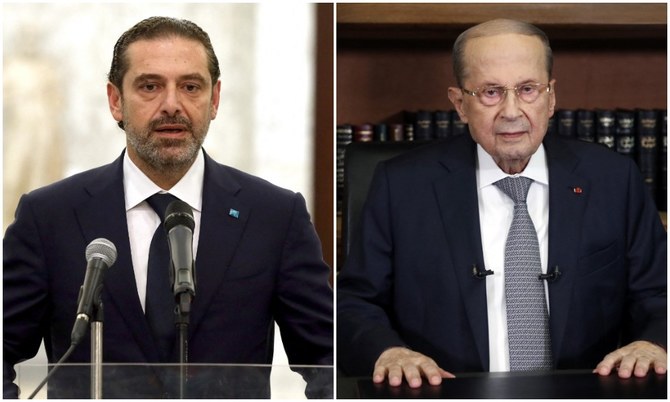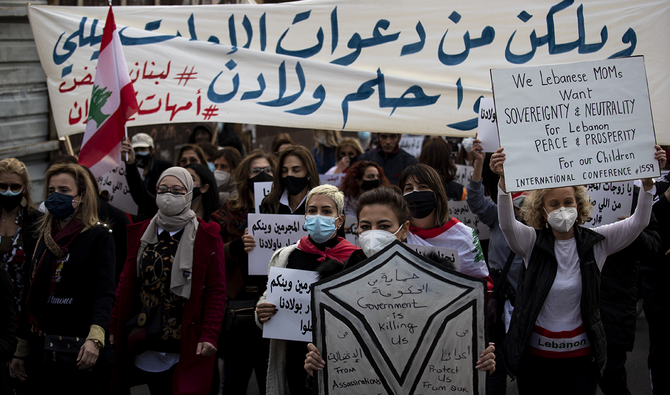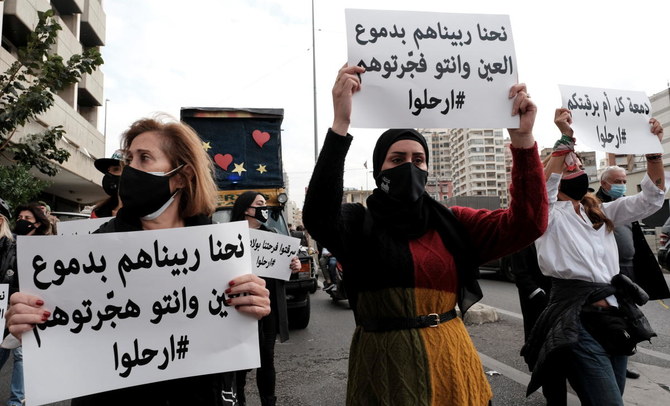
by arabnews.com -- NAJIA HOUSSARI -- BEIRUT: A critical meeting on Monday between Lebanese President Michel Aoun and Prime Minister-designate Saad Hariri on the country’s uncertain future failed to reach an agreement. The 18th meeting between the two men, held at the Presidential Palace, was met before and after with pessimism by much of the Lebanese public. Hariri insists on forming a government of 18 independent specialists acting as ministers, without the capacity for a blocking third by any party, while Aoun and his Free Patriotic Movement (FPM) propose a government of 20 ministers, with the right to name 6 ministers in addition to an Armenian minister. After Monday’s meeting, which lasted just 35 minutes, Hariri said that Aoun sent him on Sunday “a complete ministerial structure in which the portfolios were distributed among the sects and parties, along with a letter telling me that it is advisable to fill it out. “The list includes a blocking third of his political team, whether the government consists of 18, 20 or 22 ministers. “He asked me to suggest names for the portfolios according to the sectarian and party distribution that he had prepared.”
Hariri said that he told Aoun during the meeting that “this is unacceptable because it is not the prime minister—designate’s job to fill out lists prepared by anyone, and it is not the job of the president to form a government. “Our constitution clearly says that the prime minister-designate forms the government and puts the names, and discusses his formation with the president of the republic. As a result of this, Hariri said: “Accordingly, I respectfully informed him that I consider his letter as if it had not been sent. I returned it to him and informed him that I would keep a copy of it for history.” Hariri said he previously suggested a government formation to Aoun more than 100 days ago, and told him: “I am ready for any proposals and amendments to names and portfolios. Even with his insistence on the Interior Ministry, I suggested a solution for him. Unfortunately, his answer was clear: The blocking third.” Hariri added: “I have one goal, which is to put an end to the collapse and the suffering of the Lebanese. I asked the president to listen to the pain of the Lebanese and give the country its only and last chance for a government of specialists to implement reforms and stop the collapse without disruption or narrow partisan considerations.” Hariri denied that he had previously provided Aoun with broad lines for his government. He distributed to the media the list of “specialized ministers” that he presented to Aoun on Dec. 9, requesting that “public opinion be the judge.”

By NADIM SHEHADI -- arabnews.com -- Two parallel narratives about Lebanon prevail: One is about the country being a failed state and the other is about a state that has been battered until it failed. According to the first narrative, Lebanon is an artificial country created by colonial powers; it never became a proper sovereign nation, while its people are divided and have no sense of patriotism or nationalism and only care for narrow family and sectarian interests at the expense of the country as a whole. It also states that Lebanon is a failed state ruled by a corrupt sectarian elite, a kleptocratic oligarchy of former warlords and feudal families whose allegiances are to foreign powers and who have perpetuated their rule through clientelism and gerrymandered elections. The country was bankrupted by a Ponzi scheme run by an alliance of mafia-style bankers and militia leaders. This point of view maintains that Lebanon was never a viable project and its history is one of continuous conflict and external intervention, with a few cease-fires in between. Furthermore, there is no real productive and self-sufficient economy; it is a rentier economy consisting mainly of services that are totally dependent on volatile external relations, and it is thus not sustainable. Hence, Lebanon should invest in industry and agriculture, as well as modern information technology and innovation.
According to this narrative, last year’s Beirut blast was the result of corruption and negligence and the lack of movement on reforms and a recovery plan since the financial collapse of October 2019. It was caused by the selfishness and carelessness of the ruling class. The whole political establishment is thus rotten to the core and must resign en masse (“all means all”) and political parties should be abolished and replaced by competent technocrats with extraordinary powers to enact reforms and implement the policies needed to get Lebanon out of this crisis. Meanwhile, the battered state narrative declares that the country has been subjected to a systematic and coordinated “battering” since September 2004, when UN Security Council resolution 1559 challenged the Syrian presence and the arms of Hezbollah. Lebanon gradually became held hostage by Hezbollah, which effectively replaced Syria, and the ransom paid every year to keep the hostage alive has bankrupted the country.
by english.aawsat.com — Lebanese former Prime Ministers Najib Mikati, Fouad Siniora and Tammam Salam deplored President Michel Aoun’s behavior towards Prime Minister-designate …

by arabnews.com -- NAJIA HOUSSARI -- BEIRUT: Women took to the streets on Saturday afternoon on the eve of Mother’s Day, despite warnings from doctors about the risk of the coronavirus spreading. Mothers’ anger at the current situation, which has prompted a generation of young people to migrate, pushed dozens to protest. A group of mothers gathered in the Bechara Al Khoury area in Beirut and went to downtown Beirut and to the port, site of the port blast seven months ago. They wore face masks and waved Lebanese flags and banners. The mothers cried and shouted slogans, demanding that the politicians leave.
The protests took place as dozens of flowerpots, wrapped in glossy colorful paper, were spread out in front of flower shops in Beirut and its suburbs on Saturday. Among their leaves were signs showing their price of 40,000 Lebanese pounds ($26). The front of bakeries and patisserie shops were filled with cakes, whose prices ranged from 50,000-150,000 Lebanese pounds. Mother’s Day on Sunday in Lebanon coincides with the beginning of spring. The Lebanese traditionally spend lavishly on gifts for their mothers or wives. But celebrating the occasion this year is different. Compared to the situation in previous years, there are hardly any customers in the clothing and perfume stores in the main shopping centers.
The prices, as Mrs. Samar said, “are extremely high for those who get their salary in Lebanese pounds. They can barely buy food and baby milk, if they can find them at all, so how can I buy a jacket for my mother whose price is twice my salary? Or how can buy her a bottle of perfume whose price is more than 1.5 million Lebanese pounds?” The dollar continued its decline on Saturday, trading at between 10,100-11,000 Lebanese pounds. The country is waiting for the outcome of the meeting betwen President Michel Aoun and Prime Minister-designate Saad Hariri on Monday, but expectations are not high. After meeting President Michel Aoun on Saturday, Lebanese Progressive Socialist Party Leader Walid Jumblatt, said: “We have reached absolute stalemate amid the economic collapse. Hunger is knocking on people’s doors, and reconciliation has become necessary. God bears witness that I have told people (the reality of the situation).” Legal money changers are also cautious. Bilal Ghandour, an owner of a jewelry store in Beirut, said: “On Saturday, money changers refrained from selling dollars. They only bought dollars, fearing that the exchange rate of the dollar would rise on Monday after the meeting at the Republican Palace.” Ghandour described sales in his shop as “very light.” He said: “The price of a gram of 18-carat gold is $42, which means 462,000 Lebanese pounds, as per the exchange rate on Saturday, and a small piece of gold must be more than five grams. The situation is very difficult.” “Those who have dollars can buy, but they only buy pieces whose prices do not exceed $200-$300.”
Khazen History


Historical Feature:
Churches and Monasteries of the Khazen family

St. Anthony of Padua Church in Ballouneh
Mar Abda Church in Bakaatit Kanaan
Saint Michael Church in Bkaatouta
Saint Therese Church in Qolayaat
Saint Simeon Stylites (مار سمعان العامودي) Church In Ajaltoun
Virgin Mary Church (سيدة المعونات) in Sheilé
Assumption of Mary Church in Ballouneh
1 - The sword of the Maronite Prince
2 - LES KHAZEN CONSULS DE FRANCE
3 - LES MARONITES & LES KHAZEN
4 - LES MAAN & LES KHAZEN
5 - ORIGINE DE LA FAMILLE
Population Movements to Keserwan - The Khazens and The Maans
ما جاء عن الثورة في المقاطعة الكسروانية
ثورة أهالي كسروان على المشايخ الخوازنة وأسبابها
Origins of the "Prince of Maronite" Title
Growing diversity: the Khazin sheiks and the clergy in the first decades of the 18th century
Historical Members:
Barbar Beik El Khazen [English]
Patriach Toubia Kaiss El Khazen(Biography & Life Part1 Part2) (Arabic)
Patriach Youssef Dargham El Khazen (Cont'd)
Cheikh Bishara Jafal El Khazen
Patriarch Youssef Raji El Khazen
The Martyrs Cheikh Philippe & Cheikh Farid El Khazen
Cheikh Nawfal El Khazen (Consul De France)
Cheikh Hossun El Khazen (Consul De France)
Cheikh Abou-Nawfal El Khazen (Consul De France)
Cheikh Francis Abee Nader & his son Yousef
Cheikh Abou-Kanso El Khazen (Consul De France)
Cheikh Abou Nader El Khazen
Cheikh Chafic El Khazen
Cheikh Keserwan El Khazen
Cheikh Serhal El Khazen [English]
Cheikh Rafiq El Khazen [English]
Cheikh Hanna El Khazen
Cheikha Arzi El Khazen
Marie El Khazen